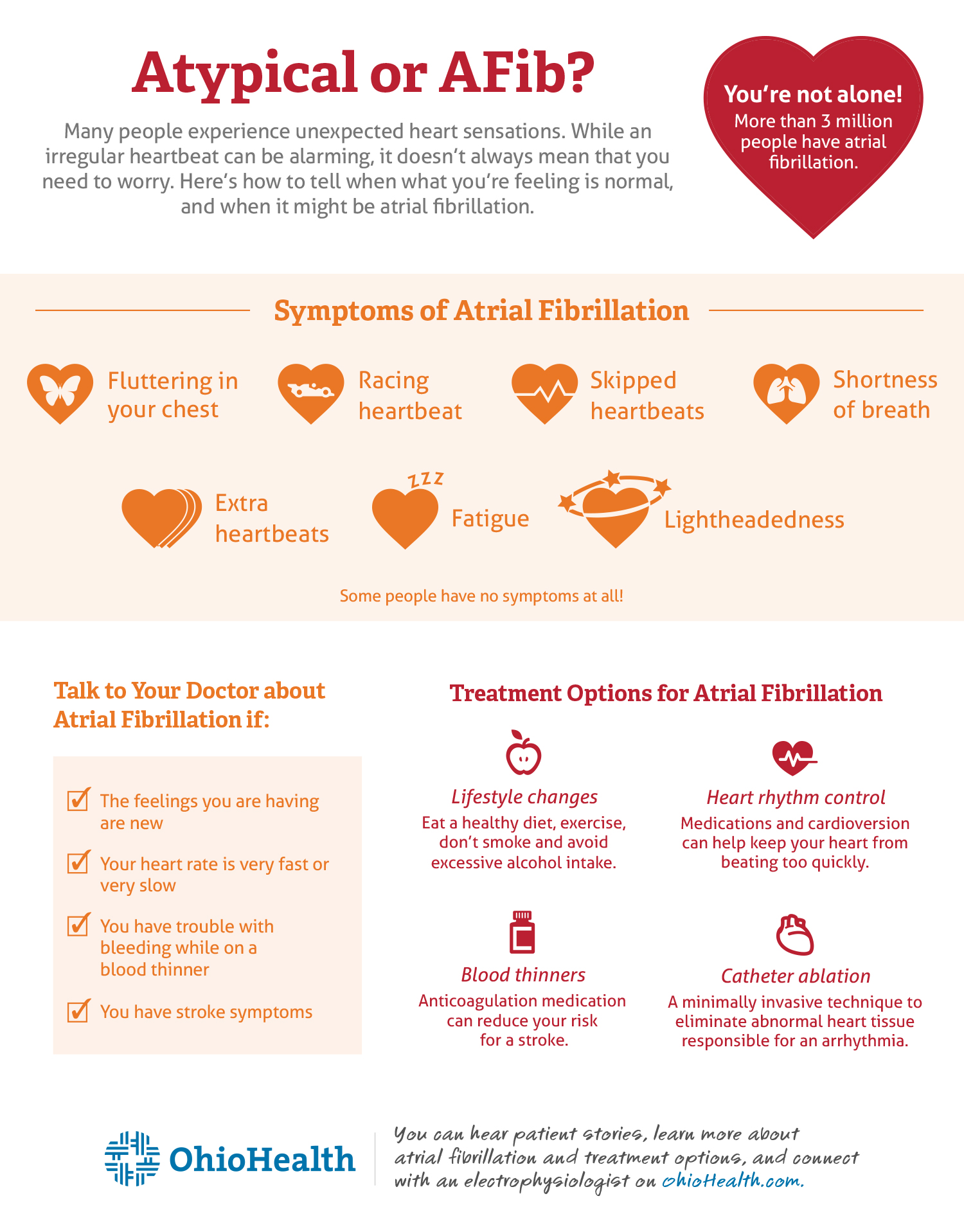
Butterflies in your stomach – you know the feeling. That flutter sensation that creeps up before a big work presentation or meeting someone on a blind date.
But have you ever felt butterflies in your chest? Or is it like your heart is still running the marathon you’ve already finished? We asked Andrea Robinson, MSN, ACNP, an electrophysiology nurse practitioner and clinical program leader for the Atrial Fibrillation Clinic at Riverside Methodist Hospital, what these feelings mean and when to call your doctor.
Atypical or AFib?
Many people experience unexpected heart sensations. While an irregular heartbeat is undoubtedly unusual and alarming, it doesn’t always mean you need to worry.
“Feeling extra heartbeats can be benign. An irregular or extra heartbeat is sometimes part of your normal heart rhythm. These extra or skipped beats may be premature ventricular or atrial contractions and can also be triggered by caffeine, exercise or extra stress,” says Robinson. “But if your heart feels like it’s racing and it doesn’t go away, it could be atrial fibrillation, a common cardiac arrhythmia.”
Atrial fibrillation (AFib or AF) occurs when the electrical impulses in your heart aren’t working as they should. A healthy heart beats 60-100 times per minute at rest, but atrial fibrillation causes it to beat faster, sometimes up to four times the resting rate. This causes the heart to pump less efficiently, leading to a lack of oxygen and symptoms like shortness of breath, fatigue or lightheadedness. Robinson says some patients may even have no symptoms at all.
As for what causes it, Robinson says you may be at a higher risk for atrial fibrillation if you have had prior heart valve problems, heart attack or heart surgery, or have hypertension, diabetes mellitus, obstructive sleep apnea, thyroid disorders, lung problems, are overweight or consume alcohol or tobacco products.
“We can never say there is one single cause of atrial fibrillation, and some people with atrial fibrillation have no identifiable risk factors,” says Robinson. “The best thing you can do is discuss with your doctor any risk factors you might have and try to modify them by eating a heart-healthy diet, exercising regularly, avoiding excessive intake of alcohol and abstaining from smoking. Sleep apnea is also one of the most commonly ignored risk factors, but one of the most treatable.”
When to talk to your doctor about atrial fibrillation
Robinson says you should contact your doctor if:
- The feelings you are having are new, and you have not felt them before
- Your heart rate is very fast or very slow
- You have trouble with bleeding while on a blood thinner
- You have stroke symptoms: numbness or weakness on one side of the body or face, difficulty with speech or thoughts, changes in vision or balance, or a sudden headache
Your doctor will probably first review your medical history and perform a physical exam to determine any risk factors you have. They may also order a heart ultrasound, called an echocardiogram, to evaluate your heart valves and heart structure.
“An echocardiogram gives us an idea of how well your heart is pumping, inspects the four chambers of the heart, and can also be used to help assess your risk for a stroke,” says Robinson.
“Atrial fibrillation itself isn’t usually dangerous, but stroke is the most dreaded complication of the arrhythmia. People with atrial fibrillation are five times more likely to have a stroke.”
Robinson recommends that you know your risk factors for an atrial fibrillation-related stroke and discuss with your healthcare provider using the CHA2DS2-VASc calculator to determine your stroke risk and whether or not blood thinning medication may be appropriate for reducing your risk.
Other methods to test your heart’s rhythm include wearing a Holter monitor to measure your heart’s activity over 24 hours or up to 30 days. Patients can now use smart watches or phone apps to monitor their heart for AFib, too.
Treatment options for atrial fibrillation
Atrial fibrillation can be a chronic and progressive condition that is not necessarily curable but can be treated.
There are 4 Pillars of Afib Management and include:
- Rate control: managing or preventing your heart from beating too fast with medications
- Rhythm Control: Returning to or maintaining your heart’s normal rhythm with medications, cardioversion, or catheter ablation
- Stroke Prevention: Preventing blood clots from forming through the use of medications or implantable devices
- Risk Factor Modification: Focusing on lifestyle choices that may increase risk for afib
Your Afib Care team may recommend one or all of these management pillars based on your individual needs. The goals of care are to improve a patient’s quality of life and prevent or slow disease progression.
Your doctor will prescribe a treatment plan based on factors such as:
- Age
- Symptoms and symptom frequency
- Whether your heart rate is under control
- Stroke risk
- Other medical conditions
Robinson says catheter ablation, a minimally invasive technique used to eliminate the abnormal heart tissue responsible for an arrhythmia, is the most effective treatment available to maintain normal rhythm. Cardioversion, which uses a low-voltage shock applied to the chest to restore a normal rhythm, is another option, though often with temporary results.
You’re not alone with atrial fibrillation
If your heart is beating irregularly and you are concerned that you may have atrial fibrillation or another cardiac arrhythmia, know that you are not the only one. Many people experience these symptoms, and about 3 million people have atrial fibrillation.
OhioHealth’s Electrophysiology team is ready to help if you need it. The team includes experts in minimally invasive procedures, physicians, advanced practice providers, nurses and pharmacists. It also participates in numerous clinical trials, offering patients access to the latest treatments for atrial fibrillation.
There is also an Atrial Fibrillation Clinic, which specializes in seeing patients with Afib and ensuring a comprehensive approach to management.
You can hear patient stories, learn more about atrial fibrillation and treatment options, and connect with an electrophysiologist on OhioHealth.com.





